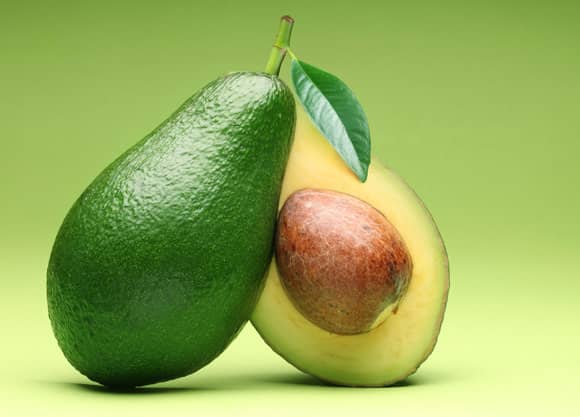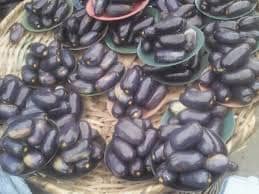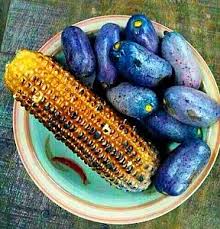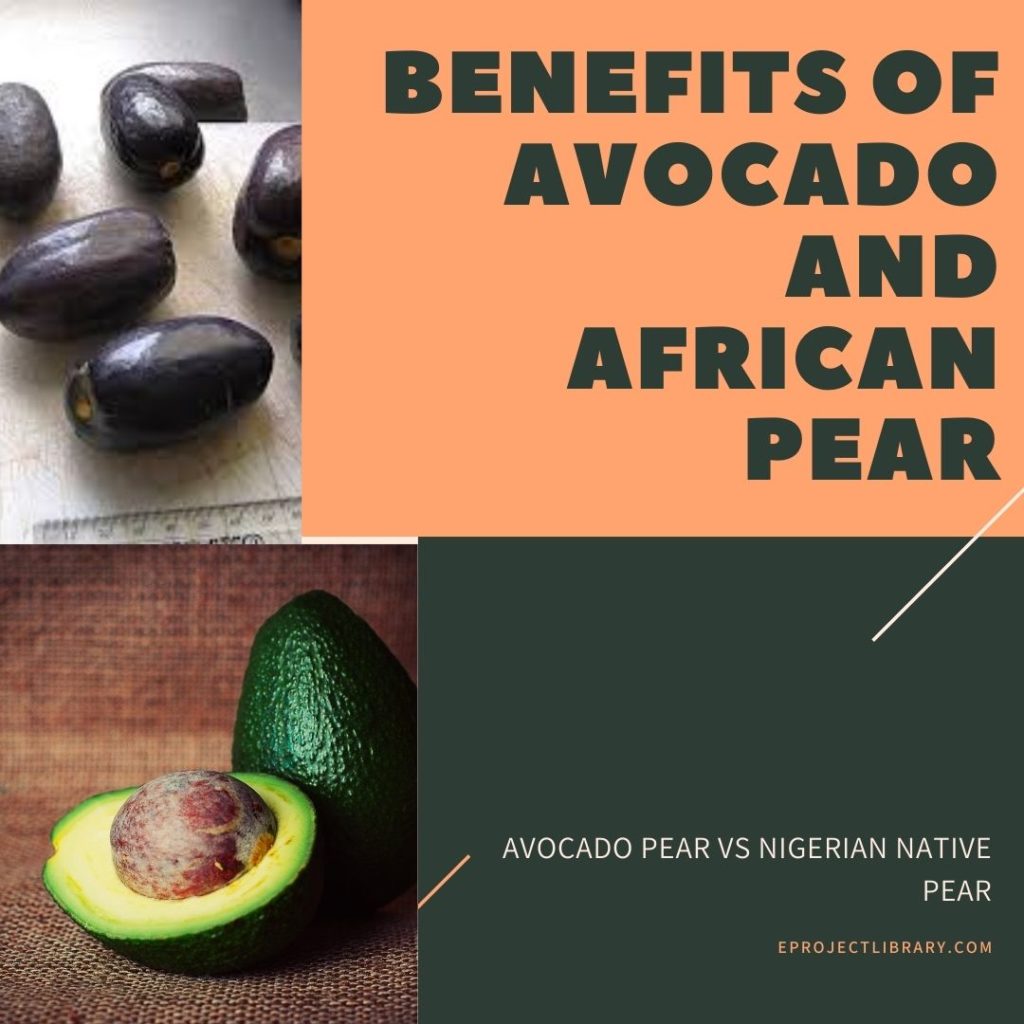Avocado Pear (Persea americana)
Avocado pear or alligator pear the fruit of Persea americana (Avocado) is largely consumed in Nigeria for its delicious buttery taste and feel.
The fruit is not sweet, but distinctly and subtly flavored, with a smooth texture.
Avocado fruit has higher fat content than most other fruit, mostly monounsaturated fat.
Also, it serves as an important staple in the diet of consumers who have limited access to other fatty foods.
such as high-fat meats and fish, dairy products.
The Price of Avocado Pear at the Local Market
The price of the avocado fruit in the local market varies depending on its size.
The average price of small avocado pear is about 50NGN ($0.13), the medium size is about 100NGN ($0.26), and the large size ranges between 150 -300NGN ($0.39 – 0.78 ) depending on the market.

Local Recipes and Consumption of Avocado Fruit
Avocado pear is largely consumed in Nigeria for its delicious buttery taste and feel.
In Nigeria, the avocado pear is commonly consumed raw or in combination with white rice or with bread as a sandwich.
It is also used to make milkshakes together with other fruits. check out the recipe for an avocado milkshake.
Also, It is used as the base for the famous Mexican dip known as guacamole.
As well as a spread on corn tortillas or toast, served with spices.
Avocados are commonly served on sandwiches, sushi, toast, salad, or chicken.
The avocado is common in vegetarian cuisine as a substitute for meats in sandwiches and salads because of its high-fat content.
Drop a comment below and link and share your favorite recipe
Advertisement
African Pear or Ube (Dacryodes edulis)
The Nigerian native pear or African pear or Bush pear is commonly known as “Ube“ by the Igbo ethnic in Nigeria, “Safou” in Cameroon, and “Atanga” in Gabon.
The African or Nigerian native pear is one of the famous seasonal fruits in Nigeria.
It is grown in almost every compound and farm in rural areas of southeastern Nigeria.
The African pear has potential to improve nutrition, boost food security, foster rural development and support sustainable landcare.

The Price of African Pear at the Local Market
Compared to the avocado fruit, the African pear (Ube) is smaller in size and cheaper in price.
The African pear are of different sizes and the average market price depends on the quantity of the pear.
- The small sizes of 5-10 units are about 150 – 200 NGN ($0.39 – 0.52)
- The Big sizes of 5-10 units are about 200 – 300 NGN ($0.52 – 0.78)
Local Recipes and Consumption of African Pear (Ube)
The African pear can be eaten either raw, cooked in salt water, or roasted.
Cooked flesh of the fruit has a texture similar to butter.
In Nigeria, ube is famously consumed either roasted or cooked together with cooked or roasted maize.

Nutritional Value of Avocado Pear and African Pear
AVOCADO PEAR
Avocados are fresh and contain all the life-giving elements and minerals the
the body can utilize.
Because it is not synthetic and is in the proportion that nature intended it to be properly utilized by the body.
The average caloric value of the edible portion of the commonly used fresh fruits contains from 175 to 400 calories per pound.
This absolutely fresh, and easily marketed, fruit has been found by investigators to contain Vitamins A, B, C, D, E, and K.
The oil contained in an avocado is as nature made it—unsaturated and unhydrogenated.
It is not a fattening agent so much as a protective anticholesterol factor that helps them to balance the really fattening and sometimes potentially harmful fats.
Such as the saturated fats contained in bacon, butter, whole milk, cream, ham, pork sausage, cheese, hamburger filled with fat, well-marbled steaks, chops, and the hydrogenated fats in margarine and many
shortenings.

In conclusion, The avocado contains this valuable anticholesterol factor in its oil.
Mrs. Housewife should not worry about the calories in an avocado but should be taught that the avocado gives a much-needed dietary supplement.
It is a food — a source of protein, minerals, and vitamins
Advertisement
African Pear (Ube)
African pear (Dacryodes edulis) contains more oil than the avocado pear.
The pulp contains 48% oil, The fat content of this fruit is much higher compared to fruits such as apple, guava, and pawpaw. It is also rich in vitamins.
Proximate analysis of African pear revealed the follwing:
| S/n | Parameters | Value |
|---|---|---|
| 1 | Moisture | 44.45-50.93% |
| 2 | Lipid | 30.55-35.60% |
| 3 | Protein | 2.89-4.16% |
| 4 | Ash | 2.65-2.76% |
| 5 | Crude Fibre | 1.52-1.61% |
| 6 | Carbohydrate | 9.75-12.59% |
Data presented by Omogbai and Ojeaburu (2010) has shown that:
The most abundant mineral element in the fruit pulp of African pear is phosphorus (692.55 – 698.40mg/100g)
The potassium content ranges between 540.81 – 553.15 mg/ 100g and it is higher in value compared to the avocado pear.
The African pear is rich in calcium with values ranging from 347.50 – 354.6 mg/ 100g, magnesium (280.15 – 287.65 mg/100g), and sodium (162.50 – 170.0 mg/100g).
The lowest concentration of nutrients use recorded for zinc (3.65 – 3.81 mg/100g), iron (3.43 – 3.58 mg/100g) and copper (0.38 – 0.45 mg/100g).
In conclusion, The African pear is high in oil and will be best for oil extraction purposes.
However, high protein and mineral content may be best for food supplementation.
Health Benefits of Avocado Pear
- Lower LDL cholesterol and boost HDL cholesterol, contributing to cardiovascular health: The fats in avocados, like other plant foods, are mostly healthy monounsaturated fats. As well as providing fat-soluble vitamins, the monounsaturated fats in avocados help to control cholesterol production and may reduce the risk of cardiovascular disease. See Ginger and Garlic
- Plant sterols, Soluble Fibre: Avocado provides around 2-gram total fibers per 50gram serve with two thirds soluble fiber. In a similar manner to plant sterols, soluble fibers can lower cholesterol re-absorption from the intestine. See Benefits of Date Fruit.
- Antioxidants, and reduces High Blood Pressure: The Polyphenols Vitamin C, carotenoids, vitamin E are compounds with antioxidant effects that help to protect cells from free radical harm. These compounds also have anti-inflammatory effects that may help prevent atherosclerosis or the thickening and hardening of the arteries associated with heart disease.
- Improve glucose tolerance for people with diabetes type 2 diabetes: studies have shown the effects of avocado in those with type 2 diabetes mellitus, reduces the blood glucose levels caused a minor cholesterol-lowering effect with no major changes in High-Density Lipid cholesterol. The avocado diet was associated with a greater decrease in blood triglycerides and glycemic control.
- Assist in weight management: 200g a day of avocado could be consumed in an energy-restricted diet without compromising weight loss when substituted for 30g of other dietary fats.
- Improves Eye Health: Avocados provide an affluence of benefits as they contain carotenoids and help to boost High-Density Lipid cholesterol and their healthy fats absorb fat-soluble carotenoids from other foods. Carotenoids help to reduce the risk of macular degeneration and are transported to the macula by High-Density Lipid cholesterol (Noorul et al., 2016).
Advertisement
Health Benefits of African Pear
- Antioxidant activity: The leaves of Dacryodes edulis elicited a very high antioxidant effect and the oil from African pear has high DPPH radical scavenging activities. See Date Fruit Health Benefits
- Prevents Cancer, Premature aging, Atherosclerosis, and Diabetes: The antioxidant effect of the resin oil, including DPPH radical scavenging activities and inhibition of lipid peroxidation and suggesting that Daryodes edulis may help prevent oxidative damage in the human body such as lipid peroxidation associated with cancer, premature aging, atherosclerosis, and diabetes.
- Cardiovascular activity: D. edulis oil has been studied to decrease the HDL cholesterol level. Thus, potential health-related functions of dietary plants such as Dacryodes edulis were reported to include immunostimulation and nervous system action.
Other Traditional Uses of Dacryodes edulis
- Treating Skin Infections: The leaves are often crushed and the juice released to treat generalized skin diseases such as scabies, ringworm, rash, and wound.
- Oral hygiene: The stem or stem twigs are employed as chewing sticks for oral hygiene.
- Antiemetic Effect: When chewed with kola nut, its leaves serve as an antiemetic (preventing vomiting).
- Antimalarial activity: Its leaf sap could be used for treating ear infections, fever, headache, malaria, and cephalgia.
Advertisement

this is highly educational and worth trying, your write ups are awesome thanks for the enlightenment I feel kinky